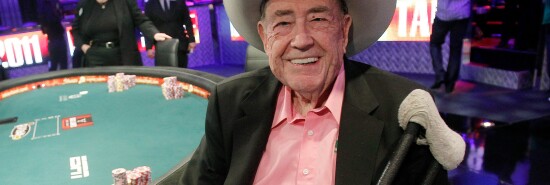
Doyle Brunson, 1933-2023
Karol Markowicz
I had already mourned Doyle Brunson.
In September 2012, when Twitter was still fairly new, the Doyle Brunson Twitter account @texdolly manually retweeted (that was a thing, kids) an announcement of Brunson’s death. “Doyle Brunson (1933-2012) AT LEAST IT IS A DIFFERENT KIND OF RIP DOYLE:-) good night sweet prince.”
The news spread quickly: The Texas Dolly was gone.
I didn’t know Brunson. Outside of a few Twitter interactions and spotting him at “Bobby’s Room,” since renamed as “Legends Room,” at the Bellagio in Las Vegas, he was just as much a celebrity to me as any out-of-reach Hollywood star. But I never cared when celebrities died, and I suddenly cared quite a lot that Brunson was gone.
Poker was in peril at that time. A few months prior, on April 15, 2011, the Department of Justice had unsealed an indictment against the biggest poker sites in the country. That day, dubbed “Black Friday” by players, seemed like the beginning of the end for the game. The giant Full Tilt Poker and PokerStars were no more. The smaller Doyle’s Room site was gone too.
We couldn’t lose Doyle, too — not now.
And then he was back, laughing at the error. A site had reported his death, complete with the “good night sweet prince” line, and Brunson had attempted a retweet noting that, for once, they were saying nice things about him. Poker might have been in trouble, but Doyle was still with us.
Poker had been in boom times in the years leading up to Black Friday, with championship games being shown on ESPN. A few years earlier, a hapless everyman improbably named Chris Moneymaker had won the World Series of Poker Main Event, kicking off the mainstreaming of poker.
But it was characters such as Doyle who drew me and so many others to the game. Moneymaker was fun to watch, his imperfect play part of his appeal, but watching Doyle was watching a master at work. It helped that he looked the part. The young guys in sunglasses and their hoodies pulled tight around their faces seemed like a fad. Doyle was like what poker was supposed to be and had been for some time.
A tall man in a cowboy hat, Brunson was going to make a career out of basketball until an injury set him back. Instead, he became a poker player and famously won back-to-back World Series of Poker Main Events, in 1976 and 1977, with the same terrible hand: 10-2. His bestselling book on poker strategy, Super/System, is widely considered the poker bible.
Brunson’s love for his family was always evident. He once direct messaged me on Twitter after I had tweeted that I was born in Russia that his daughter-in-law, Anjela Brunson, the wife of his son, Todd Brunson, was too. He just wanted to express pride in his family.
He had suffered a tragedy, and he knew what mattered. In 1982, his daughter, Doyla, died of a heart condition. Her death made him turn to religion, and he frequently tweeted about his Christian faith.
In 2018, Doyle Brunson played his last Main Event and quit poker altogether, saying, “I am going to quit poker because I’ve been married to the most wonderful woman in the world for 57 years, and she’s not in very good health. I’m going to spend our last years together as much as we can. I’m 85 myself, so it wouldn’t be any big upset if I didn’t wake up some morning. We don’t have a lot of time, and I would like to spend it with her. That is my priority.” He loved the game, but he chose his family.
I thought of the 2012 death announcement when I saw the headline last week that the Godfather of Poker had died at 89 at his home in Las Vegas. This time it was true. Poker might not be as popular on ESPN anymore, but it continues to grow, with several thousand more players in the Main Event last year than in 2012, when poker seemed on its deathbed.
Doyle had gotten some good years with his family, just like he wanted. Good night, sweet prince. Good game.
